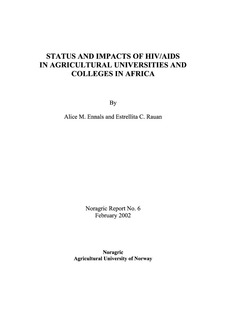| dc.description.abstract | The report looks into the status, impact and preventive actions taken by some of the partner universities and colleges in Africa of Agricultural University of Norway (NLH) against the spread of HIV/AIDS. Countries included in the study are Botswana, Ethiopia, Eritrea, Kenya, South Africa, Uganda, Malawi and Tanzania. Overall it showed that there is a growing recognition of the problem on campus, most universities have established special HIV/AIDS Committees and have information campaigns to new students. However, little is included in research and curriculum development. Neither are anyone making projections of what future losses of staff and students will mean for the university or the agricultural sector. Successful institutional and societal responses to HIV/AIDS require leadership. Universities play a role in the leadership of their communities. The key findings from the study are as follows:
Status of and impact of HIV/AIDS: No one knows the status due to the nature of the pandemic and the structure of reporting and health systems. The perceived trend points to females as a vulnerable group. The impact is felt but the magnitude is hard to know due to the fact that no one knows the status except for some universities in Kenya. Overall, the study revealed that there is an impact, in varying degrees, amongst students and staff. The impact is felt either through leave of absence, effect on teaching quality, dropping out to take care of sick relatives, or students’ output being affected. Loss of skilled labour is proving to be a problem for the universities, as it would take more time to train new staff.
Assessment of Present Programs by Agricultural Universities and Colleges: Most government programs in the study are promoted by the Ministry of Health, are in the start phase, targeting mainly students, with an emphasis on the biological-medical aspect. The social and psychological aspect is currently being included through peer education. The feedback on peer education is positive in that it is a powerful tool with a more holistic approach. A critique of the available information campaigns is that it is mostly from the top and western in its approach, neglecting important cultural elements. Ethical issues came up with keywords such as: discrimination, secrecy and denial, behaviour change, gender relations, exclusion from PhD grants, access to expensive medicines etc. Another issue was the role and responsibilities of the professors are important - especially in how they treat young vulnerable female students. Most universities are officially following a non-discrimination policy and most of the countries signed the UN Convention, but in practise this is a challenge.
Based on the study we came up with the following recommendations: Expressed Needs from Universities and Colleges: The needs expressed by most universities are curriculum development and regional networking. Due to the nature of the problem, the universities were concerned in having interdisciplinary and multilevel research. NORAD on the other hand has a key role in helping to fight the pandemic. The involvement is basically facilitating, coordination and support of current and future programs through:
integration of HIV/AIDS dimension in institutional collaboration agreements;
contribute to research development by facilitating an interdisciplinary collaboration between Norwegian institutions and the African counterparts;
support curriculum development initiatives, student peer education and outreaches, maintain current university operations through filling projected decrease in staff in students
and lastly being instrumental in creating a node in Norway that coordinates and acts as a clearinghouse for HIV/AIDS and agriculture. | nb_NO |

